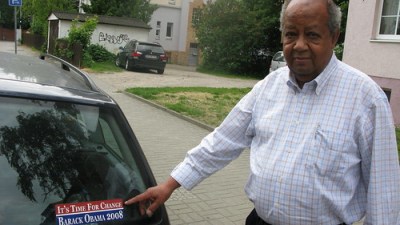A Black German Survivor of the Holocaust & Barack Obama

When Barack Obama visits the German concentration camp at Buchenwald this Friday, he might meet prisoner no. 40489 – one of its last surviving witnesses. 80-year old Gert Schramm, born in Erfurt (Thuringia), was once the youngest German prisoner there. And the only black inmate.
A black German in a concentration camp? Gert Schramm wonders today if the American president is aware of the term „Blutschande“ (incest), that meant a death sentence for himself and his father. His story begins at the end of the 1920s in the town of Erfurt. Jack Brankson, an engineer with a steel company from San Francisco, arrived in Thuringia in order to build a bridge. The young man needed a new suit. He looked handsome as he entered the shop of gentlemen’s tailor Kurt Schramm. There he met Marianne, the owner’s daughter. The young people fell in love and in November 1928 their son Gert was born. The bond between the white German woman and the black man from American must have been strong, since even after the termination of his contract, Jack Brankson keeps coming to Thuringia where his son grows up with his grand parents. But in 1941, Brankson is arrested during one of his visits to Germany on the basis the Nazi racial laws and deported to the Auschwitz concentration camp. There is no trace of him after that.
Gert Schramm himself is arrested in May 1944. For weeks, he is moved from one Gestapo prison to another, beaten up and knocked around until, in July 1944, he is finally deported to Buchenwald. Schramm is 15 years old when the gate with the inscription „Jedem das Seine“ (Each to his own) closes behind him. As a product of „incest” between a white German and a black American he was taken into „protective custody“. „Protective custody for at least 15 years“, the old man recounts today.

He would like to show the American president the foundation walls of block 42, the camp’s section for political prisoners with his pallet. Up to five men had to share one bed – completely exhausted after three weeks of drudging in a stone pit. „I was lucky that I was put in with the political prisoners. The communists saved my life since I would not have survived the stone pit.“ Schramm recalls how they carried up to ten corpses each day from the quarry back to the camp. Many died of exhaustion or were shot „on the run“. It was such arbitrariness that almost drove the weary boy into desperation. During the daily roll call, the smallest offense was punished by death. Whoever stood out or broke the ranks could not survive in a concentration camp. Being the only „negro“, how could he of all the people stay unnoticed? How could he „disappear“ among the 70.000 prisoners? Willy Bleicher, a communist and unionist responsible for collecting statistical data on the camp’s inmates for the SS, manages to get the boy „transferred“ from the stone pit to the “Baukommando Drei”. He is assigned to the food counter, until he regains his strength. Otto Grosse, the oldest inmate of Block 42, manages to get the youngest German prisoner at Buchenwald shielded by the other prisoners during the daily roll call.
Schramm would like to tell all that to Barack Obama who has his own family connection with Buchenwald. His great-uncle Charles T. Payne was one of the American soldiers of the 3rd US army under General George S. Patton who advanced to Buchenwald, enabling the remaining prisoners to free themselves on April 11th, 1945. Perhaps Obama´s great-uncle was among those US-soldiers who five days after liberation of Buchenwald confronted a thousand citizens of Weimar with heaps of corpses. Gert Schramm still recounts the horror on the faces of these good citizens and their claims: „We did not know what was going on!“ He never believed them. In June 1945 Gert Schramm returns home, on foot, into a new life.
In his living room in Eberswalde, Brandenburg where he had been running a cab company for many years, an German icon is hanging above the sofa: a belling stag in front of the Alps. Schramm is a father of four, grandfather as well as great-grandfather, and a widower since last year. What saved his life? „It was solidarity“, he is convinced. His fellow inmates protected him, the black German boy, with a civil courage that he has rarely seen these days. As a member of the volunteer fire department all too often after German reunification, he had to extinguish incendiary agents that neo-Nazis once again and still throw at people. Gert Schramm is not a political person; he was never a party member. But when neo-Nazis in today’s Germany chase people again, he regards this mainly as a political failure. For years, he has been visiting schools to talk about Buchenwald. He often faces young people who openly parade their radical right-wing attitudes through combat boots and skinheads. He is still on the prisoners’ advisory board of the Buchenwald Memorial foundation. Schramm is convinced that evil needs to be confronted early on. It is his life lesson. America’s first black president is a role model and a barer of hope: “I hope that they take good care of him, he must not end up like Kennedy.” Should he meet Barack Obama, Gert Schramm would like to thank him for America’s role in the liberation from the Nazis.


